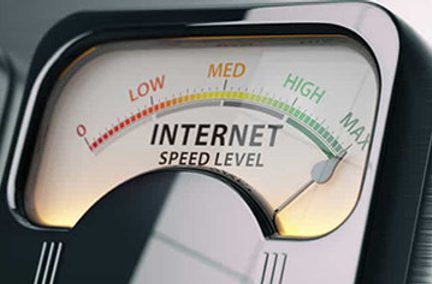What Are Data Caps and Throttling in Home Internet Plans?
Aug 12, 2025 | Home Technology, Helpful Tips, Digital Literacy

When shopping for home internet, many people focus on internet speed and price. That’s an important place to start, but there’s another factor that’s just as important: data caps. While some internet service providers (ISPs) offer truly unlimited data with no catches, others, such as satellite and the popular 5G, limit how much data you can use each month. These limits can affect your internet experience, especially if your household regularly streams video, plays games online, or works from home.
What Are Data Caps?
A data cap limits the total amount of data you can use during your monthly billing cycle. This data includes anything you do online: streaming video, browsing the web, downloading large files, making video calls, or using Wi-Fi for your smart home devices. Every activity that requires an internet connection contributes to your data usage.
For example, watching Netflix in HD can use up to 3GB per hour. That means streaming just 3 hours a day could consume over 270GB in a month, a significant chunk of most data-capped plans. Factor in online gaming, social media, other streaming services, work meetings, and software updates, and you might be using terabytes of data without realizing it.
Data caps are different from data speeds, which determine how much data flows to and from devices at any moment. Data speeds is how fast data flows from point A to point B, usually explained in megabits per second, similar to how fast a car can go in miles per hour. Data caps are how much total data can be used, like a car’s gas tank. You get one tank of data gas per month. Once it’s empty, the car stops, regardless of how fast it was going before. It’s speed vs distance. In the internet world, a 600 megabits per second (Mbps) plan means that at any given time, up to 600 Mbps can be flowing through the internet connection. Conversely, a 1TB per month data cap means you can only transmit and receive a total of 1TB of data per month, regardless of the speed. Once you’ve used up all 1TB of data allowed (which isn’t hard to do nowadays), you’ve hit the cap, and your internet car is out of gas for the month.
What Happens When You Hit a Data Cap?
Once you exceed your data allowance and your tank has run dry, your ISP has options about what to do next:
- Charge overage fees or require you to purchase additional data (gas)
- Automatically enroll you in a more expensive add-on package (more expensive gas)
- Throttle your speeds, meaning they intentionally slow down your connection (stretch your gas longer by making you drive slower)
- Suspend or restrict your account in extreme cases (take away your car)
Which choice varies widely by provider. ISPs such as Xfinity, Cox, Sparklight, and Mediacom often enforce usage limits and overage charges. Others, like AT&T, T-Mobile, and Verizon Fios, may include unlimited data plans on their wired services. However, depending on your plan and location, they can still throttle down your connection during peak hours, slowing down your internet speed.
Satellite and Fixed Wireless Providers
Satellite internet providers like HughesNet and Viasat, and some fixed wireless (5G) providers, such as T-Mobile, Verizon, and others. frequently use data limits as part of their pricing structure. Even if they advertise “unlimited” usage, they may slow speeds dramatically after you pass a soft cap. These models can impact everything from loading emails to enjoying smooth streaming video.
Why This Matters
The type of connection you choose, whether DSL, satellite, fixed wireless, cable, or fiber internet, affects more than just your download speeds. It determines how much you can use your connection. Families relying on high-bandwidth activities, like remote learning, working from home, or multi-device internet access, need to be especially aware of internet data caps.
If your provider enforces a 1TB data limit and your household regularly consumes 1.5TB per month, you could face additional fees, degraded performance due to throttling, or be forced into an expensive unlimited data upgrade. These extra costs can turn an affordable-looking plan into an unexpectedly high monthly bill.
What to Look For
When evaluating internet service providers, check the FAQs on their websites or ask directly:
- Is there a data cap on this plan?
- What happens if I exceed my data?
- Are there extra fees for additional data?
- Is this a truly unlimited internet plan?
Understanding these terms can help you make a more informed decision and avoid surprises at the end of the month.
Where can you find out about these plans and how they handle data use and overage?

Broadband Nutrition Labels
The Federal Communications Commission (FCC) recently ruled that providers must fully disclose internet plans, monthly bill costs, data usage policies, and any extra fees. Commonly called the Broadband Nutritional Label Initiative, this came about due to consumer confusion about what ISPs were really offering and to provide transparency about speeds, rate plans, promotional plans, and billing. ISPs are now required to provide labels, similar to those found on prepackaged food, detailing prices, speeds, and other important information in an easily digestible format. However, that doesn’t guarantee it’s easy to understand the details buried deep inside terms and conditions. The FCC is working hard to change that, but there is still work to do.
The Download
Choosing the right internet plan isn’t just about finding the fastest speed or the lowest price. It’s about understanding how much total data usage your household needs and whether your provider can support that without hidden charges or performance slowdowns. If your lifestyle includes frequent streaming, online gaming, working from home, or sharing a connection with multiple users, make sure your plan supports unlimited data or offers clear options if you exceed your data limit.
BTW, none of our plans are capped in any way. No limits, no slowdowns. Full throttle all the time. Just sayin’...
- data caps
- internet throttling
- unlimited data
- satellite internet
- dsl
- cable






